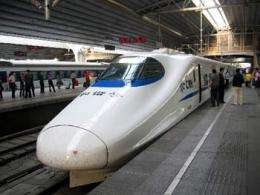(PhysOrg.com) -- China is planning high-speed rail networks in the next decade between China, Europe, the UK, Asia and India, with trains running at over 320 kph. Train passengers will be able to travel to Beijing from London's King's Cross station in only two days.
Passengers boarding in London could travel to Singapore (10,800 km away) via Beijing in only three days. Wang Mengshu, a senior consultant on domestic railways in China, and a member of the Chinese Academy of Engineering, said their goal was for trains to be running almost as fast as planes.
The plans are for three networks. One would connect London and Beijing, traveling via the Channel Tunnel, then continuing on to Singapore, while the second would include Malaysia, Burma, Vietnam, and Thailand. The third would connect China to Russia, Germany and the European rail networks. Wang said they hoped all three networks could be completed within the next ten years, and that negotiations have already started with 17 nations affected by the projected networks, which would be the biggest infrastructure project in history. The rail networks would carry raw materials and other goods as well as passengers.
Wang said the idea first came from other countries, particularly India, that wanted high-speed trains and hoped to benefit from China’s experience and technology. China is rapidly expanding its own railway network, building almost 30,500 kilometers of tracks over the next five years, and connecting all major cities in China with high-speed railways. The Harmony Express, the fastest train in the world, running at almost 400 kph, was unveiled last year to link Guangzhou and Wuhan. The train uses Kawasaki and Siemens technology, but was built entirely in China.
Construction of the Asian network has already begun in the southern Yunnan province, and Burma is soon to start construction of its section of the network. China has offered to pay for the Burmese section in return for Burma’s rich lithium reserves. Prospecting and survey work has already been done for the European network, and there is already an agreement for a high-speed rail link across Siberia.
The biggest issue in the project is money, which would be partly government money, partly bank loans, and the rest raised by the railways from private sector financing or the host countries. Wang said they would prefer host countries to pay in natural resources, as the Burmese are doing, rather than through capital investment.
© 2010 PhysOrg.com





















